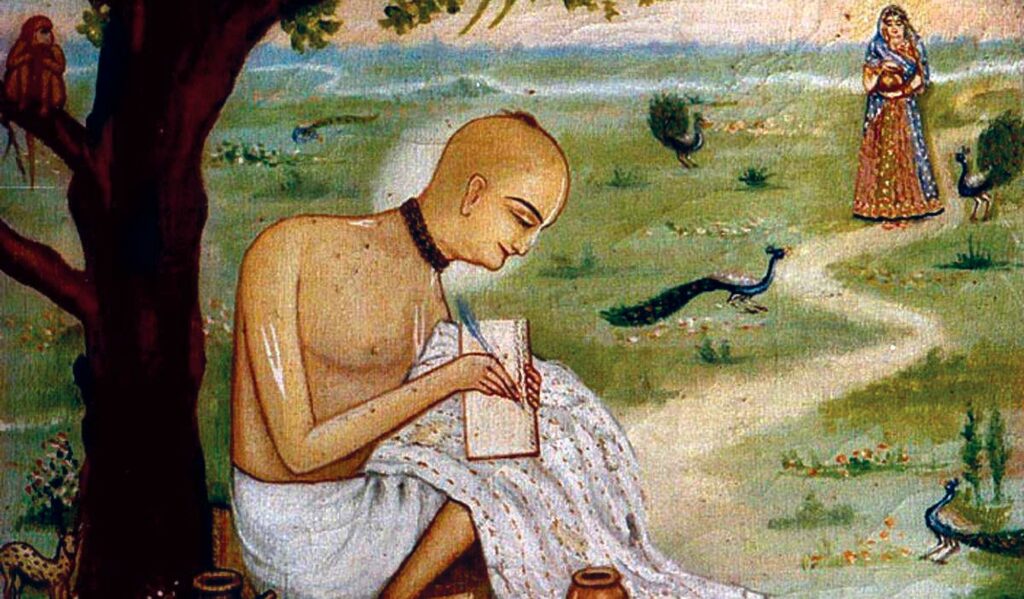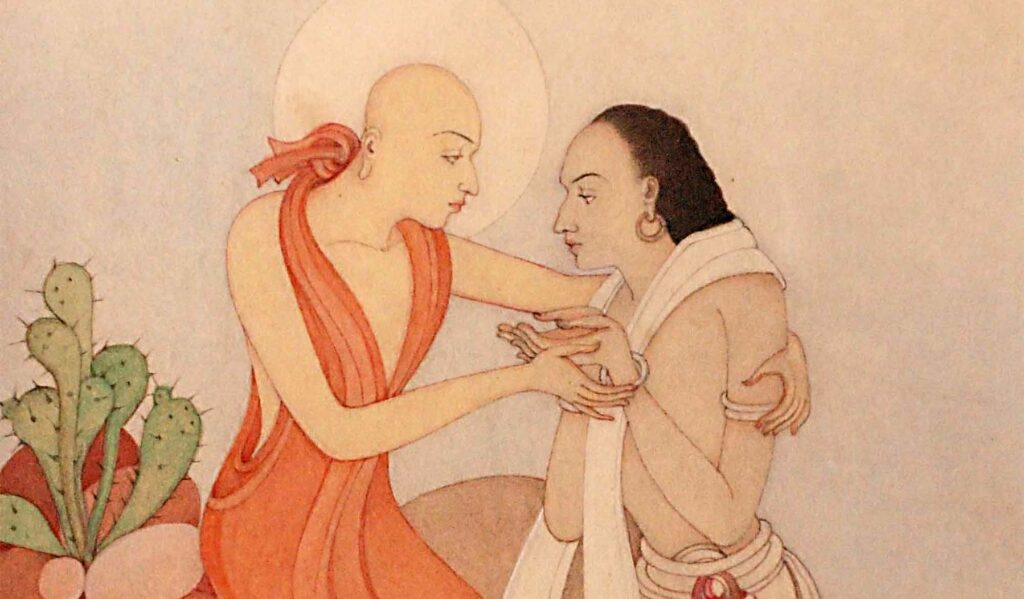Overview
In 'Can I Dovetail It?' Kalki Dāsa explores the common notion amongst devotees of 'dovetailing' - using everything in Kṛṣṇa's service, and asks "Are such things really pure devotion, or are we simply attached to fulfilling our desires and using Kṛṣṇa as an excuse?"
When Śrīla A.C. Bhaktivedanta Swami Prabhupāda came to the western world he established the activities of Mahāprabhu’s saṅkīrtana movement with bold enthusiasm and an uncompromising spirit. On his order, hari-nāma saṅkīrtana, or congregational chanting of the Name of Kṛṣṇa, was performed all day long in major international cities such aas New York, London, Los Angeles, and Melbourne, along with book and prasādam distribution. Equally important to Śrīla Prabhupāda was that the society become sustainable by developing farm communities which would supply fresh milk-products and vegetables for the Deities, as well as providing the devotees with a simple, down to earth lifestyle that encouraged higher thinking. This would demonstrate the practical application of spiritual culture to the general public. These primary objectives of Śrīla Prabhupāda engaged the devotees, attracted the public, and formed the backbone of the modern ‘Hare Kṛṣṇa’ movement.
The way that Śrīla Prabhupāda engaged the devotees according to their tendencies and talents was something exceptional. This is one of the hallmark qualities of a genuine ācārya.
The ācārya or the spiritual master’s duty is to give direction to the disciples how he can fix up his mind always on the lotus feet of Kṛṣṇa. He knows how to engage a particular devotee in a particular type of service. Sva-karmaṇā tam abhyarcya (Gītā 18.46). Everyone has got some particular talent. So it is the duty of the spiritual master to engage his disciple’s talent in the service of the Lord so that constantly he can think of the Lord. (Śrīla Prabhupāda, Vṛndāvana 1974)
Śrīla Prabhupāda trained the artists in painting, the musicians in kīrtana, the business-oriented in organising events, the responsible administrators in managing centres, and the intellectually inclined in book publishing, editing, and speaking the philosophy. The task which Śrīla Prabhupāda undertook was gargantuan. Without wasting any time he utilised everything and everyone around him for the mission of his guru.
Devotees collected money from many different sources. Śrīla Prabhupāda accepted all that energy and directed it towards establishing centres, printing books, and in the service of the Deities. The devotees worked hard to collect whatever they could for the pleasure of their guru, and Śrīla Prabhupāda reciprocated with the genuine attitude of the devotees. By accepting the devotees offerings, he purified the tendency to utilise those resources for one’s own selfish interest. To emphasise the point that money is an energy of Kṛṣṇa, Śrīla Prabhupāda taught the devotees to use the word, ‘Lakṣmī’ in place of ‘money’ as a conscious reminder.
Money is meant for service of Nārāyaṇa. So if you have got money, don’t spoil it like Rāvaṇa, but engage it in Kṛṣṇa’s service. If you have got money, just spend it for very costly temple, for installing Lakṣmī-Nārāyaṇa, Rādhā-Kṛṣṇa, Sītā-Rāma, like that. Don’t spoil your money in other way. Then you’ll always remain rich. You’ll never become poor. But as soon as you try to cheat Nārāyaṇa, that “I have taken Your Lakṣmī,” you starve. That policy is very bad.” (Śrīla Prabhupāda, lecture 2nd December 1977)
All the disciples of Prabhupāda donated everything they had to the movement when they joined. Such sacrifice was the standard at the time, and their dedication pleased Śrīla Prabhupāda immensely. Ultimately devotee businesses were seen by Śrīla Prabhupāda as a means to an end – the end being the purchasing of farm land for the development of sustainable spiritual communities. By impressing this ideal of simple living to his disciples, Prabhupāda was encouraging work in the mode of goodness rather than the system of modern economic development, which unavoidably tethers one to the modes of passion and ignorance. As for supporting the movement financially, he saw that book distribution would provide the necessary ingredients for everything.
Business means if you have got extra grains or extra foodstuff, you can sell. That is business. We are not going to open mills and factories. Where there is necessity? No. We are not going to do that. That is śūdra business. The real business is that you produce enough food grains, as much as possible, and you eat and distribute. That’s all. This is business. He does not require any so high technical education. Anyone can till the ground and grow food. Huh? Is it difficult? This is the business. The first thing is that everyone, man and animal, especially the cows, they must be properly fed so they become very stout and strong. (Śrīla Prabhupāda, morning walk, March 14th, 1974)
Nearly fifty years since the disappearance of Śrīla Prabhupāda, it seems that most members of the movement are still shackled to the modern economic system and the wishes of Prabhupāda for the development of these farm projects remain largely unfulfilled. Unfortunately many leading devotees have only encouraged dependency on this system by remaining attached to business enterprises, and undertaking elaborate projects that don’t align with Prabhupāda’s vision of self-sustainability and simple living.
In light of Gauḍīya philosophy, we see that many activities that have sometimes been referred to as ’saṅkīrtana’ may simply have been the anarthas of those men who led these projects. What started as a passionate attempt to increase book sales morphed into devotees up-selling paraphernalia, and the eventual selling off of the farms to purchase more properties in the cities. None of this however seems to correspond with Śrīla Prabhupāda’s vision of ‘simple living and high thinking.’ If devotee businesses support the Kṛṣṇa consciousness movement, they are taken as favourable for the cultivation of bhakti. On the other hand, if business becomes disconnected from the blessings of the guru, or interferes with preaching activities, it only brings trouble to the guru’s mission.
Śrīla Śrīdhara Mahārāja explains how making money does not always translate as ‘pure devotional service’:
On the normal plane, we have earned our previous karma, and from there we should begin. We should not be attached to those things that are detrimental to our normal life. Although presently they seem to be helping, they are not making a real contribution. We should understand that this applies not only to intoxication, but even to money.
dhana-śiṣyādibhir dvārair yā bhaktir upadyate
viduratvād uttamatā hānyā tasyāś ca nāṅgatā
(Bhakti-rasāmṛta-sindhu, Pūrva 257)
We may think that devotion may be earned by spending money, by using one’s son or wife for the cause of devotion. “I am helping my wife to practice devotional activities, so I shall get the benefit,” or “I am utilising my son for devotional purpose, so by virtue of this I shall acquire devotion,” or “My śiṣyā, my disciple, is becoming a good devotee, so as a guru, I must get something through him.” These things are not real devotion. Dāna, śiṣya, are only bodily thought. By giving money to the devotees, by helping the devotees, we may get some benefit, but it is not śuddha–bhakti. It may be sukṛti, but not pure devotion. This is because money or these other things do not belong to us. Due to misidentification, we falsely think that we are masters of this or that. Our whole selves should be devoted. (Śrīla Śridhara Mahārāja)
Great ācāryas like Śrīla Prabhupāda and Śrīla Śrīdhara Mahārāja had the capacity to receive large amounts of money and purify those contaminated offerings by directing it towards the centre. This however, was not their only objective. The main objective of any pure devotee is to inspire the conditioned souls to surrender wholesale to Kṛṣṇa, and to show us how we can move in that direction.
Śrīla Śrīdhara Mahārāja explains elsewhere about ‘dovetailing’, or the practice of yukta-vairāgya as taught by Śrīla Bhaktisiddhānta Sarasvatī Ṭhākura:
Instead of channeling material energy for Kṛṣṇa’s service, if one adopts the path of renouncing matter in fear of becoming contaminated by it, this will have a negative impact on our hari-bhajana. Śrīla Prabhupāda (Śrīla Sarasvatī Ṭhākura) has taught us the practice of engaging everything pertaining to this world in the service of Kṛṣṇa. This is the unique position of Śrīla Prabhupāda. Śrīla Prabhupāda has spoken about the cultivation of devotion to Kṛṣṇa or activities dovetailed towards the immutable spiritual plane. But he has not prescribed endeavours in mundane perishable activities. Endeavours in such mundane activities cannot be considered as the cultivation of devotion to Kṛṣṇa
Śrīla Prabhupāda has taught about kṛṣṇānuśīlanam (activities dovetailed in service of Kṛṣṇa). If we try to understand the teachings of Prabhupāda through our own individual mental speculation we will ultimately be deceived. Like the demon Rakta-bīja, we are constantly developing a multitude of fresh anarthas. If we approach Prabhupāda’s teachings with various mental concoctions we will be unable to harmonise. We will never be able to understand the harmonising aspect of Prabhupāda’s teachings through our own individual endeavours. (Śrīla Śrīdhara Mahārāja – article from Dainika Nadīyā Prakāśa 1944)
What we can gather about ‘dovetailing’ from the above quote is that it must be kṛṣṇānuśīlanam, pleasing to Kṛṣṇa. And who knows how to please Kṛṣṇa? His manifest representative, Śrī Guru.
Although it may be a popular idea to take those things that one is attached to (such as making money, playing music etc.) and offer them to Kṛṣṇa, the guru may or may not instruct his disciples to do such things. How the guru acts is based upon the inner inspiration he receives, with the consideration of what will best help the student. The disciple’s duty therefore is to try and carry out the order of his guru, regardless of whether that service is something he likes or not.
Śrīla B.G. Narasiṅgha Mahārāja explains as follows:
Śraddhā and śaraṇāgati (faith and surrender) presupposes sevā. First surrender, then serve: tad viddhi praṇipātena paripraśnena sevayā. This surrender means far more than one’s strict obedience to a master or teacher of a particular technique or thought. Surrender means, complete obedience to the will of Kṛṣṇa and not to that of anything else. First surrender (praṇipātena) then serving mood (sevayā) manifests. And to surrender one must have faith, śraddhā.” (Swami B.G. Narasingha – ‘Real Religion is not Man Made‘)
If we neglect this point, then what we may consider ‘dovetailing’ is simply like a dog chasing his tail around in circles. This is perhaps why, after years and years, so many devotees continue to pursue more and more energy (men and money) in the name of ‘saṅkīrtana,’ rather than improve their conception of chanting the Holy Name, and the quality of their service.
In my personal experience, I studied music seriously for a number of years, both as an improviser and a composer. Exploring sounds and instrumentation from around the world, my exploration of music ultimately led me to the spiritual culture of India, and to reading Bhagavad-gītā for the first time. After encountering the knowledge I found there, I began to understand that my pursuit of music had brought me to a fork in the road and now I had to make a choice. Would I remain an artist and use that knowledge as creative inspiration, or would I pursue the life of a truth seeker? For years people I met tried to tell me the two paths could be merged, but I wasn’t convinced. Quite honestly I was confused. Even ‘Hare Kṛṣṇa’ devotees told me such things. It wasn’t until years later when I met my Guru Mahārāja, Śrīla Bhakti Gaurava Narasiṅgha Mahārāja that I heard an answer that resonated. My Guru Mahārāja taught me that certain tendencies and abilities could be engaged in devotional service and other things only become distractions. By hearing this from him and many other profound things, I felt that I had finally met my guide, and was ready to move under his direction.
I realised that music took me somewhere, and my Guru Mahārāja was encouraging me to take my next step. In time, he began to redirect my creativity and curiosity for exploration down positive avenues such as writing, multimedia, and researching subjects connected to the ancient Vedic culture. He did not encourage me however to become a professional ‘kīrtana artist’ and mix kīrtana and music together (which are actually like ghee and water), using Kṛṣṇa’s Name to serve my lower purposes. Our Guru Mahārāja approached kīrtana and all the other processes of bhakti in a simple, straightforward manner, with all emphasis laid on serving the Holy Name. In this way he kept spiritual life and our mundane desires isolated from one another so that we could make genuine progress. Now, under the valuable guidance of our Guru Mahārāja’s godbrother, Śrīpāda Bhakti Kiśora Āraṇya Mahārāja, the ideal he gave us continues to be cultivated and further refined.
When most of us begin spiritual life we are totally absorbed in the mode of passion, and thus we require constant positive engagement. If we strictly follow the guru’s instructions, then the contaminating influence of the modes of passion and ignorance will naturally dissipate and make us more attentive to inner, spiritual goals. Through a conscious effort to simplify our life, we go from being “too busy to be Kṛṣṇa conscious” to finding more energy and time to personally devote in the right direction. This is possible only by the mercy of our well-wishing guardians.
Another characteristic of the mode of passion is that it conditions one to seek rewards – something which is also gradually purified through proper association. A pure devotee doesn’t anticipate any reward from his actions other than more devotional service and more energy to perform it.
Prahlād Mahārāja prays to Lord Nṛsiṁhadeva as follows:
My dear Lord, I repeatedly pray unto Your lotus feet that I may simply be stronger in devotional service. I simply pray that my Kṛṣṇa consciousness may be more strong and steady, because happiness derived out of Kṛṣṇa consciousness and devotional service is so powerful that with it one can have all the other perfections of religiousness, economic development, sense gratification and even the attainment of liberation from material existence. (Hari Bhakti Sudhodaya)
The inner fulfilment that manifests on the path of pure devotion is sublime, surpassing any result obtained through works in the mundane world, but it does not necessarily come right away. Because it is our nature to seek ānanda, we generally try to bring objects under our control, and demand that they satisfy our senses — subtle or gross. By applying the same process to spiritual life, we end up frustrated by unfulfilled ambitions. In reality, the fulfilment that comes from bhakti-yoga begins as a ‘heart-feeling’ that one is moving in the right direction, and slowly grows into a genuine taste for spiritual life. My Guru Mahārāja once remarked that, “The real satisfaction of the disciple is seeing that the guru is pleased, and that his godbrothers and godsisters are benefiting from his instructions.” This is the key to lasting happiness.
“Slow and steady” is a good motto for us to adopt. If we follow exactly in the footsteps of our guardians our success is assured. Surrender is a path – not something that simply happens one fine day by living in an āśrama for a certain number of years, or by donating lots of money. Sometimes devotees fall into the trap of becoming impatient and run ahead to imitate the activities of mahā-bhāgavatas, thinking that one can just “fake it till you make it.” Our Guru Mahārāja told however that the ‘highest thing’ is our next step, and we should concern ourselves with that. Whether one is a householder or a sannyāsī, the principle is the same — sincerity and determination are the integral elements on the path of surrender, and we must learn to be patient on the long road home.
In the words of Śrīla B.R. Śrīdhara Mahārāja:
“Slow and steady wins the race. It is a long journey, not a journey to finish within a few hours or a few days or a few years; a continued appointment. It is to go on a long way. So we have to adjust accordingly. Not that we should run quickly and then we shall stop and sleep. It is not a matter of that type. It is a long way we will have to walk on. And so our attitude will be such, then we will be successful, tṛṇād api sunīcena. No cause, we should not extend any cause for resistance, which will create resistance. Won’t create such circumstance that invites resistance; tṛṇād api sunīcena. Still if any resistance unexpectedly approach me, I shall try my best to forebear, being conscious that my guardian’s eye is over me. He is also eager to help me in my campaign. I am not alone.” (Śrīla Śrīdhara Deva Gosvāmī Mahārāja)
It seems that there is a very fine line between accommodation and too much liberality in the manner of spreading Kṛṣṇa Consciousness. By going too far over the edge in the name of ‘saṅkīrtana’ one can easily slip away from the path he or she sets out on. In order to search out that line, we would do well to study the previous ācāryas — how they attracted sincere people to the movement, and how they engaged them in service.
Related Articles
Further Reading
Prema Dhāma Deva Stotram with the Narasiṅgha Sevaka Commentary – Verses 61-65
In verses 61 to 65 of 'Prema Dhāma Deva Stotram', Śrīla Śrīdhara Mahārāja narrates the pastime of Śrī Caitanya at Caṭaka Parvata In Purī and explains how the scriptures produced by Brahmā and Śiva are ultimately searching for the personality of Mahāprabhu who is merciful too all jīvas, no matter what their social position.
Prabhupāda Śrīla Sarasvatī Ṭhākura’s Visit to Ayodhyā
With the forthcoming observance of Śrī Rāma Navamī, we present 'Prabhupāda Śrīla Sarasvatī Ṭhākura’s Visit to Ayodhyā' written by Śrīla Bhaktisiddhānta Sarasvatī Ṭhākura Prabhupāda from The Gaudīyā magazine, Vol 3. Issue 21/ In December 1924, after visiting Benares and Prāyāga, Sarasvatī Ṭhākura visited the birth-site of Śrī Rāmācandra in Ayodhyā.
Śaraṇāgati – The Only Path to Auspiciousness
In this article, 'Śaraṇāgati - The Only Path to Auspiciousness', Dhīra Lalitā Dāsī analyses the process of śaraṇāgati (surrender) beginning with śraddhā (faith). She also discusses the role of śāstra and the Vaiṣṇava in connection with surrender.
Ātma Samīkṣā – The Value of Introspection
In this article, "Ātma Samīkṣā – The Value of Introspection" Kalki Dāsa highlights the importance of introspection in the life of a devotee and especially in relation to the worldly environment that surrounds us. He also explains how transcendental sound influences our capacity to introspect.
Prema Dhāma Deva Stotram with the Narasiṅgha Sevaka Commentary – Verses 61-65
In verses 61 to 65 of 'Prema Dhāma Deva Stotram', Śrīla Śrīdhara Mahārāja narrates the pastime of Śrī Caitanya at Caṭaka Parvata In Purī and explains how the scriptures produced by Brahmā and Śiva are ultimately searching for the personality of Mahāprabhu who is merciful too all jīvas, no matter what their social position.
Prabhupāda Śrīla Sarasvatī Ṭhākura’s Visit to Ayodhyā
With the forthcoming observance of Śrī Rāma Navamī, we present 'Prabhupāda Śrīla Sarasvatī Ṭhākura’s Visit to Ayodhyā' written by Śrīla Bhaktisiddhānta Sarasvatī Ṭhākura Prabhupāda from The Gaudīyā magazine, Vol 3. Issue 21/ In December 1924, after visiting Benares and Prāyāga, Sarasvatī Ṭhākura visited the birth-site of Śrī Rāmācandra in Ayodhyā.
Śaraṇāgati – The Only Path to Auspiciousness
In this article, 'Śaraṇāgati - The Only Path to Auspiciousness', Dhīra Lalitā Dāsī analyses the process of śaraṇāgati (surrender) beginning with śraddhā (faith). She also discusses the role of śāstra and the Vaiṣṇava in connection with surrender.
Ātma Samīkṣā – The Value of Introspection
In this article, "Ātma Samīkṣā – The Value of Introspection" Kalki Dāsa highlights the importance of introspection in the life of a devotee and especially in relation to the worldly environment that surrounds us. He also explains how transcendental sound influences our capacity to introspect.








